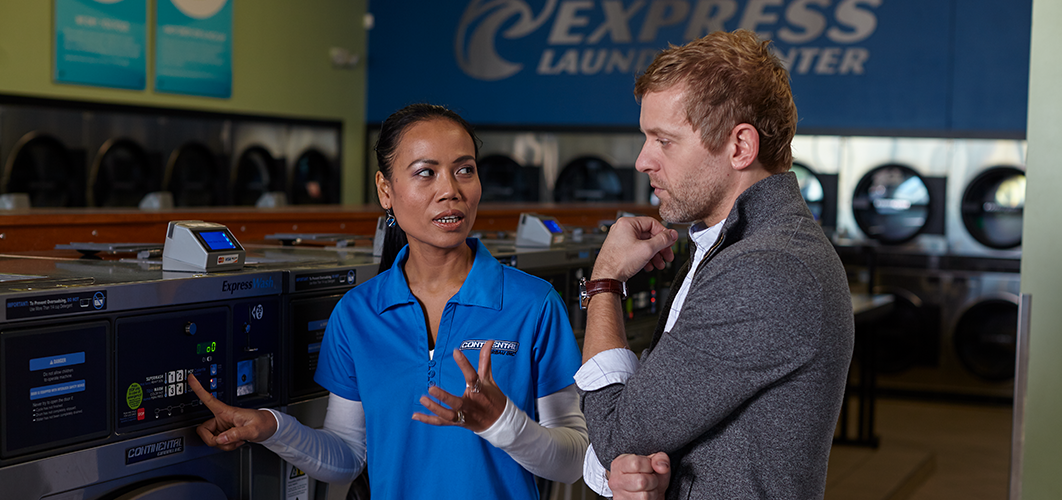It’s an animal all its own, so when negotiating a commercial property lease for a vended laundry, do your research. Your lease will be among your biggest expenses.
So it’s important to understand the various types of commercial leases and how to negotiate them in your favor. Read on for a quick lesson.
Key Things to Know
When negotiating a lease, keep the following in the back of your mind.
1. A laundry lease is the backbone of your business and must have a long enough term for you to recoup your investment. You’ll need enough term/time to eventually sell your business with sufficient term leftover for your buyer.
2. The rent, rent increases, construction free-rent period and construction costs must be manageable and controlled throughout the lease.
3. A laundry has a tremendous amount of hard and non-transportable infrastructure and tenant improvements. The landlord needs to understand that as a laundry tenant you must be extremely cautious regarding anything that would prematurely terminate the lease. Notice of default and “curing” the default are extremely important lease clauses for a laundry.
Lease Types
There are multiple types of leases based on who pays for each of the property’s expenses. Understanding them is half the battle.
Single net: Tenant pays for rent and his/her share of property taxes.
Double net: Tenant pays for rent and his/her share of shopping center’s insurance and property taxes.
Triple net: Tenant pays for rent and his/her percentage of the shopping center’s insurance, property taxes and common area maintenance costs.
Gross Lease: The benefit of a gross lease is that it is easiest for the tenant. In this type of lease, the tenant pays a monthly flat rate that includes rent, taxes, utilities, maintenance fees and security fees.
Modified Gross Lease: Tenant pays rent and utilities. Landlord pays other costs.
16 Negotiating Tips
While there’s much to consider when it comes to negotiating a lease, being prepared and proceeding professionally, alongside an agent or lawyer, are key. Below are a few of the most important tips to follow.
1) Don’t get emotionally attached to a location. If you can, negotiate on two locations at once for more negotiating power.
2) Know your budget, must-have and nice-to-have items ahead of time.
3) Proceed from a professional basis with a professionally drawn floorplan, well-crafted business plan, financial statement and credit report ready for disclosure. Show the landlord that you are an entrepreneur with whom he/she wants to do business.
4) Get a good lawyer or agent to help with the negotiations. They are experts at sifting through the jargon and clauses to get you what you want.
5) Know that you will be a mini anchor and your customers will be in their shopping center for two hours each week and will patronize their other tenants. This gives you bargaining power.
6) Be prepared to concede lease points and know which lease points you can concede and which you can’t.
7) Go in under asking price. Landlords ask for the upper amount of what they think a tenant might pay. Come in at a number that’s 10-15 percent lower. You’ll likely settle somewhere in between.
8) Get a lower base rate by negating a longer lease term.
9) Negotiate over the lease term. Make certain you have a long enough lease to ultimately sell the laundry to another owner.
10) Write in a reasonable “cure” period. A “cure” period is the length of time you get if you default on the lease. Remember that we can easily be in default because a bank credited our deposit to the wrong account and we wrote the rent check without adequate funds. In default, the landlord will seek to recover all past due and unpaid rents, damages, inducements and more!
11) Write in a co-tenancy clause. This will allow you to break or lower your lease if a major tenant that drives business to you moves out of the shopping center.
12) Verify that the building’s square footage is correct. After all, you’ll be charged on that commercial square footage.
13) Take note of the HVAC responsibility and find out if you can turn that responsibility over to the landlord or negotiate caps per year.
14) Pay attention to the “fixturing” period. That’s the time where you’re fixing up your space. Some landlords require you to redo the space yourself, but offer “rent abatement” during that timeframe. Rent abatement is an agreement between landlord and tenant that provides a period of free rent. Other landlords might require rent, but redo the space for you. A laundry takes a long time to develop. I recommend a “fixturing” period of 6 months.
15) Negotiate for those nice-to-have perks, such as advertising space on pole/monument/building signs, or exclusive customer parking in front of the building.
16) Having a pre-approval from your lender will strengthen your position on lease negotiations. If your lender requires a landlord lender agreement and/or waiver, have this agreed upon with the landlord during lease negotiations.
Do Your Research & Lawyer-Up
While negotiating a lease might seem formidable, a positive end result will serve you well over time — allowing your laundry to succeed and thrive. My advice? Before ever looking for a laundry location, take the time to become versed in commercial lease jargon and clauses. Then bring a good lawyer or commercial real estate agent on board to help you through the process.
Tod Sorensen is a regional business manager at Girbau North America and vice president of Continental Girbau West, a full-service distributorship serving the Southern California, Arizona and New Mexico vended, on-premise and industrial laundry markets. He holds more than 20 years of experience in vended laundry development and market analysis. Please contact him with any questions at tsorensen@gnalaundry.com or call 866-950-2449.


